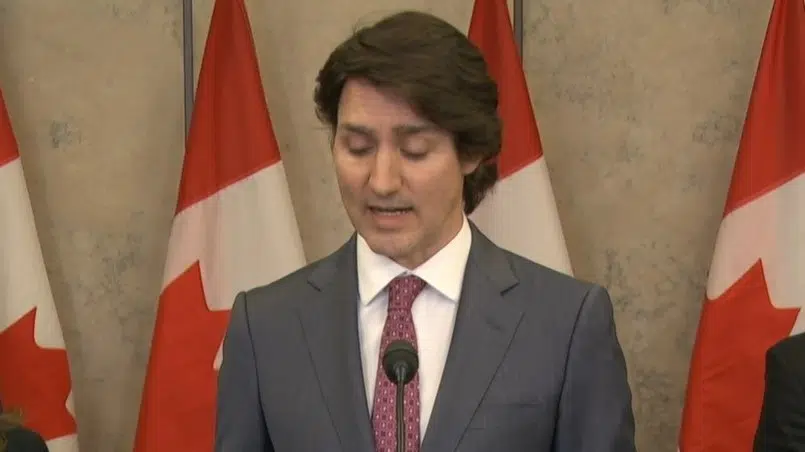A drastic step to put an end to the protests over COVID-19 measures.
Prime Minister Justin Trudeau is invoking the Emergencies Act for the first time in Canadian history.
The act grants the Federal government additional powers to assist with the handling of the protests, which have been happening across the country.
“The illegal blockades have been disrupting the lives of too many Canadians,” Trudeau stated during Monday’s announcement. “Here in our capital city, families and small businesses have been enduring illegal obstruction of their neighbourhoods. Occupying streets, harassing people, and breaking the law – this is not a peaceful protest.”
Trudeau says discussions were held with cabinet members, Canada’s premiers, and opposition leaders before making the decision.
The act gives the power to ban public gatherings in targeted areas and issue fines of up to $5,000 and jail time of up to five years on those who breach the orders.
Local police still have jurisdiction with additional access to RCMP resources. Under the act, the Mounties can enforce municipal bylaws and provincial offences.
I want to be very clear about what we are – and are not – doing by invoking the Emergencies Act, and how taking this step will help get the situation under control. In case you missed our announcement earlier today, watch this: pic.twitter.com/htGmZH09Jd
— Justin Trudeau (@JustinTrudeau) February 15, 2022
The mandate compels those capable of rendering essential services to do so, such as tow truck drivers moving vehicles blocking roads.
The act also includes significant financial powers.
Companies with trucks at blockades could see their corporate accounts frozen and banks can suspend personal accounts. The insurance on these vehicles will be suspended.
Interim Conservative Leader Candice Bergen says they want to see a peaceful and swift end to the protests, but they don’t know if invoking the Emergencies Act is the right path.
“At first blush, we are very concerned with what we see,” Bergen says. “If you look across the country, provinces are not in agreement with what the prime minister is proposing. He has said he has consulted, but they’re really isn’t collaboration or agreement. Alberta is opposed to it, Saskatchewan, Manitoba, and Quebec.”
She says more discussions will take place amongst party members to determine whether or not they will support the invoking of the Emergencies Act.
A motion for confirmation of the declaration of emergency has to be presented within one week to both the House and Senate.
The Emergencies Act was created in 1988 to replace the War Measures Act. It was defined to be used during a national emergency of a temporary nature.
The prime minister is able to implement this act in scenarios where there is public welfare at risk such as natural disasters, disease, public order disturbances as well as international and war emergencies.
The last time such powers were invoked was during the October Crisis in the 1970s when Trudeau’s father was the prime minister.
**With files from Katie Nicholls and Kevin Jeffrey.







